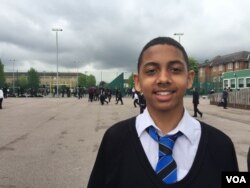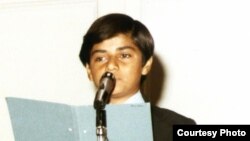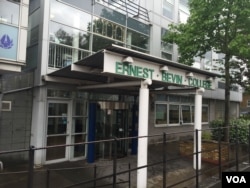For many of London's young Muslims, Sadiq Khan's rise to mayor is a source of inspiration.
This is especially true in the lower-income, ethnically mixed South London neighborhood of Tooting, where the son of a Pakistani bus driver developed an early political awareness at a time when Britain was settling into its new status as a multicultural nation.
It was there that Khan grew up, and that he attended Ernest Bevin College starting in the early 1980s.
In the schoolyard, students marvel at being part of what they see as a historic moment for British Muslims.
"He's a Muslim, he came to this school and now he is mayor of London, the first Muslim mayor of London," said 15-year-old Shakir Bouamri. "It's a bit weird, because he used to go to our school, do the same stuff, play football, in the same area."
Khan's rise is no less remarkable to analysts and pundits, who note that Khan swept to a comfortable victory by garnering the support of a majority of London's non-Muslim voters.
This represents a change in attitude that could indicate Britain may have started to turn the corner when it comes to accepting and integrating its fastest-growing minority, and a new era of empowerment for the country's Muslims.
That is how Jeremy Day, Khan's former history teacher, sees it.
"I think it would be fair to say, and I'm going to get in trouble for this, that in the 1970s and 1980s racism was maybe more overt than the racism that exists today, that is much more subtle, much more sophisticated," he said.
Activist spirit
Khan is the fifth of eight children and was born in 1970, shortly after his parents immigrated to Britain from Pakistan.
His family lived in a modest house across the street from the school. His father was a bus driver and his mother a seamstress. Former teachers describe him as a diligent student who was well behaved and who never missed homework assignments.
In Tooting, as elsewhere in Britain, Khan's family would have been viewed more as foreigners than vested members of the community. It was in that environment that Khan would develop an activist spirit that Day noticed early on.
"One thing about this school is students are not shy to express opinions, and Sadiq would be one of those. If something was not right, that would be shared with the class. They would throw up the sense of rights, values and injustices," Day told VOA.
Sadiq went on to become a human rights lawyer, something that came as no surprise to Day. "I'd learned that he joined the Labour Party, which is left of center, as a 15-year-old and how many schoolchildren do that?"
‘Wow’ factor
But what awes the teacher the most is the fact that London voters would favor a Muslim candidate at a time when so many people in Britain are questioning the country's immigration policies, contemplating an exit from the European Union largely because of those policies, and reeling from the terrorist attacks by Islamic extremists in Paris and Brussels.
"It might start with an American expression, ‘Wow.' It's a real wow factor," Day said, as he reflected on the idea that Khan would be elected by a majority in what he said is "today's political global climate, the move to the right in European politics, the media headlines of promoting division, of promoting fear."
The election campaign turned especially bitter when supporters of his closest opponent, Conservative Zac Goldsmith, sought to link Khan to Muslim extremism.
In the end, Khan beat Goldsmith by a margin of more than 300,000 votes.
Polls indicated Londoners overwhelmingly based their decision on the city's lack of affordable housing and transport concerns, issues that unite Londoners across ethnic lines.
Upon his election, Khan sought to portray himself as a bridge-builder. In his victory speech, he pledged to be a mayor for "all Londoners."
Challenges ahead
His challenges include fulfilling his promises of building more public housing and freezing public transportation fares.
But observers say his biggest challenge remains a broader, cultural one: ensuring that the children of immigrants who arrive in Britain today benefit from the opportunities that Khan did, and see themselves as full members of a society that was, until only recently, homogeneous.
"Countless books, films and odes have been written about the American Dream, but the British Dream remains ephemeral and unexamined," wrote columnist Rashid Razaq in the London Evening Standard newspaper, popular among commuters on London's tube.
Boys at Khan's alma mater in Tooting who were interviewed after his election see hope that the British meritocracy will deliver for them as it did for the man who is now mayor.
"It made me think anyone can do what they want. Anyone can be what they want," Shakir Bouamri said, "if I try hard."
Bouamri, who is of part Moroccan ancestry, said he now believes more firmly in pursuing his career dreams, although they are not in politics. "I want to be a chef, like Jamie Oliver, and I want to be successful like him."








